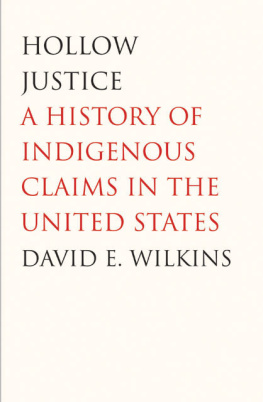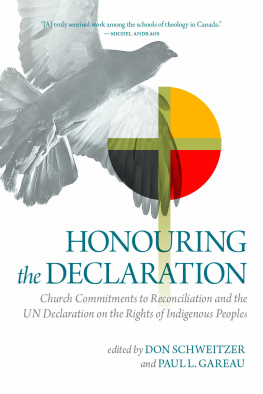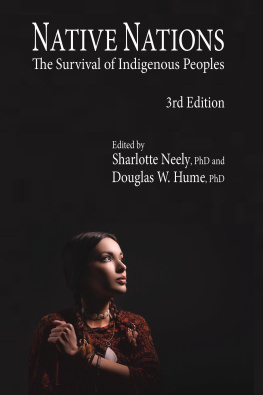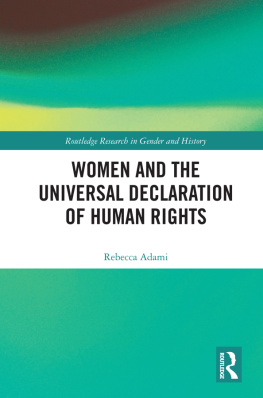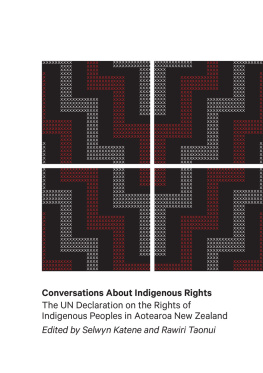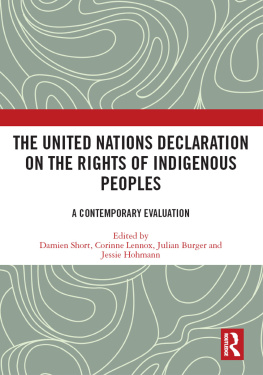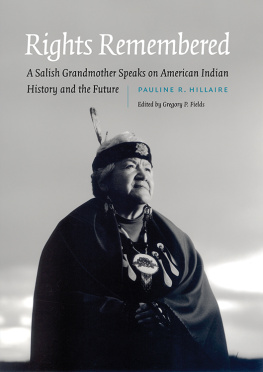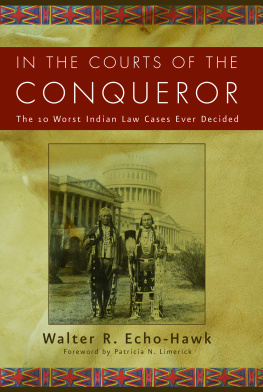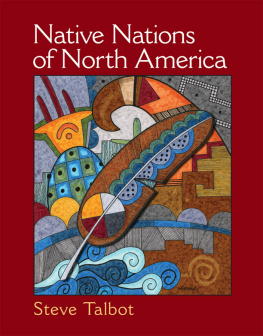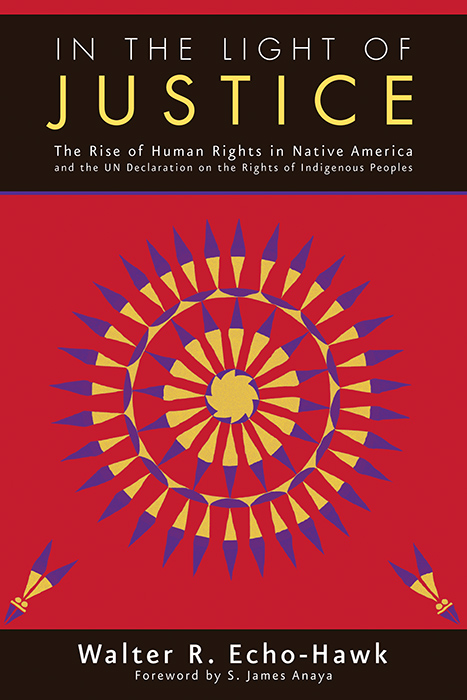Praise for In the Light of Justice
All Indian Nations should take heed of this book! It is devoted to the proposition that Native American rights are inherent and inalienable human rights. In the Light of Justice explains how the UNDRIP can strengthen Native American rights in a human rights framework. Let us answer the call and work to uplift the laws and policies of the United States so that they comport with the human rights standards of the UNDRIP.
Wallace Coffey, Chairman, Comanche Nation
In the Light of Justice is a timely and truly remarkable book. Walter brings a wonderfully creative mind and decades of fighting in the trenches for indigenous rights to the task of placing the UN Declaration on the Rights of Indigenous Peoples into proper historical perspective, showing that it is a document of millennial importance. As the book points out, the Declaration stands as a sharp rebuke to the colonialism of the past and provides a roadmap for future actiona roadmap for the world to move forward in a good way through cooperation with indigenous peoples, in whose lifeways and ethic may lie the answer to many of the worlds most intransigent problems. Walter shows how the Declaration can and must be used constructively and creatively to this end. It is an important book, not just for indigenous peoples, but for the world.
John Echohawk, Executive Director, Native American Rights Fund
Walter Echo-Hawks skillful analysis of the UN Declaration on the Rights of Indigenous Peoples offers a brilliant and impassioned justification for a new era of federal Indian law. Echo-Hawk demonstrates that the current doctrine defines Native peoples through the lens of conquest, colonialism, and race, thus cementing injustice into law. He then develops the roadmap of justice by illuminating the human rights principles that must become part of domestic law, as well as the elements of the social campaign that will be necessary to shift the hearts and minds of Americans about what justice entails for the Native Nations of these lands. Echo-Hawk is a seasoned attorney and an insightful scholar, but he is also a masterful storyteller, weaving an Indigenous cultural narrative throughout this work that is profound, moving, and quite powerful. This book is a must-read for students and scholars of Federal Indian law, as well as the leaders and advocates that serve Indian Country.
Rebecca Tsosie, Regents Professor of Law, Arizona State University
This is the book I have been waiting for: a truly probing study of justice that comes down elegantly on the side of restorative and reparative actions that heal body and soul, individual and community. Walter Echo-Hawks book is a plea for the transformation of our current system by, as native people say, making things right. His compassionate scholarship proves that acts of reparation and atonement, alongside the implementation of the United Nations Declaration on the Rights of Indigenous Peoples, will be a catharsis and a new beginning for all peoples.
Phil Cousineau, author of Beyond Forgiveness: Reflections on Atonement and The Art of Pilgrimage
Walter Echo-Hawks new book clearly demonstrates the potential of the UN Declaration on the Rights of Indigenous Peoples to positively impact United States Indian law and, most importantly, sets out a strategy and a process for implementing the Declaration into American law. Everyone who is interested in indigenous issues in the United States, or in international law and indigenous peoples, needs to read this book.
Robert J. Miller, professor and author of Native America, Discovered and Conquered: Thomas Jefferson, Lewis & Clark and Manifest Destiny (2006)
Walter Echo-Hawk has done it again. In his masterful work In the Courts of the Conqueror: The Ten Worst Indian Law Cases Ever Decided , Professor Echo-Hawk held the mythology created by the black robes of American law up to the light of truth, reason, and simple justice. In doing so, he exposed the my ths for what they are: a dark side of American jurisprudence that is continuing reliance upon long held notions of racial and cultural superiority used to dispossess Indian peoples of their lands, property, and human rights. Now his voice calls for reconsideration of these notions in light of the principals of human rights recognized by the United States and the family of nations in the United Nations recent Declaration on the Rights of Indigenous Peoples. His long years as a litigator and scholar clearly inform his balanced approach to measuring federal Indian policy against the standards of the Declaration, giving credit where due yet clearly identifying areas where changes are warranted. Echo-Hawk calls for the healing of Native America, and in the process for all of America, and has presented a blueprint for restorative justice within the context of the best of the American system, which is worthy of serious consideration by every jurist, politician, and patriotic American.
G. William Rice, Professor and Co-Director, Native American
Law Center, University of Tulsa College of Law
Text 2013 Walter R. Echo-Hawk
Artwork 2013 Bunky Echo-Hawk
All rights reserved. No part of this book may be reproduced or transmitted in any form or by any means, electronic or mechanical, including photocopying, recording, or by an information storage and retrieval systemexcept by a reviewer who may quote brief passages in a reviewwithout permission in writing from the publisher.
Library of Congress Cataloging-in-Publication Data
Echo-Hawk, Walter R.
In the light of justice : the rise of human rights in Native America and the United Nations Declaration on the Rights of Indigenous Peoples / Walter R. Echo-Hawk.
p cm
ISBN 978-1-55591-663-3
1. Indians of North America--Legal status, laws, etc. 2. Human rights--United States. 3. United Nations. General Assembly. Declaration on the Rights of Indigenous Peoples. I. Title.
KF8205.E24 2013
342.730872--dc23
2013006705
Printed in the United States of America
0 9 8 7 6 5 4 3 2 1
Design by Jack Lenzo
Fulcrum Publishing
4690 Table Mountain Dr., Ste. 100
Golden, CO 80403
800-992-2908 303-277-1623
www.fulcrumbooks.com
TABLE OF CONTENTS
by S. James Anaya
PART ONE: UNDERSTANDING THE DECLARATION
The Seeds of Change
The Making of the Declaration
Mounting the Big Horse
Legal Status of the Declaration
PART TWO: THE NEED FOR THE DECLARATION
The Legacy of Conquest
Toward an American Land Ethic
How Does the Declaration Affect the Future of Indian Law?
Does United States Law and Policy Meet UN Standards?
PART THREE: IMPLEMENTING THE DECLARATION
March Toward Justice
In the Light of Justice
United Nations Declaration on the Rights of Indigenous Peoples
FOREWORD
The United States of America is the greatest nation on earth, or so it is often said. This expression reflects homage to the visionary founders and the democratic innovation they implanted, a fundamental faith in the countrys political and economic system, and celebration of a common ethos of liberty and equality that is understood to mark American identity. Yet it is simply a matter of fact, with which Americans must contend, that the claim to exceptional greatness is wed to historical processes that defy it, if indeed the greatness of a country is dependent upon an elevated commitment to what is right and just, rather than merely being a function of power.
Embedded in the story of the country is the glorification of settlement and westward expansion over what is usually portrayed as previously untamed and uncivilized lands, glorification that is animated by a national myth of Manifest Destiny. The underbelly of this story includes the costs to the countrys indigenous, or native, peoples, who suffered material loss and social and cultural upheaval on a massive scale. Other parts of the underbelly include slavery, a diminished legal status for women, and legally sanctioned discrimination against immigrants of non-European origin, among other phenomena of oppression. A full appreciation of this underbelly leads to a less glorified telling of the American story, and to understanding Americas greatness as a projection a historically and still not fully realized onefrom the most enlightened components of the countrys institutions and practices.


